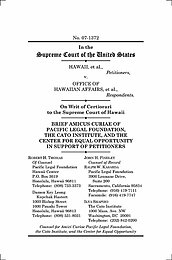Hawaii v. Office of Hawaiian Affairs
Learn more about Cato’s Amicus Briefs Program.
In the 2000 case of Rice v. Cayetano, the Supreme Court held that a race-based scheme allowing only statutorily defined “Hawaiians” to vote for the Office of Hawaiian Affairs’s trustees was unconstitutional. Despite Rice, and despite Justice John Marshall Harlan’s dissenting statement in Plessy v. Ferguson 112 years ago that “[o]ur Constitution is color-blind, and neither knows nor tolerates classes among citizens,” the OHA continues to view Hawaiian citizens through racial lenses. This practice has spawned numerous lawsuits, including the present legal crisis in which the state’s sovereign authority to manage its land for the good of all of its citizens has been replaced with a court-imposed duty to hold the land for the benefit of one racial class. Specifically, the Hawaii Supreme Court blocked the sale of certain state lands based on a mistaken (and race-based) interpretation of a joint resolution that Congress passed in 1993 to apologize to Hawaiian people for the overthrow of the Kingdom of Hawaii—which was itself based on a slanted view of history. Cato’s brief, joining with the Pacific Legal Foundation and the Center for Equal Opportunity, argues that race-based government is impermissible under the Fourteenth Amendment’s Equal Protection Clause, that the Constitution’s Indian Commerce Clause does not provide a basis for laws that grant preferences to “Native Hawaiians,” and that the Apology Resolution neither amended nor rescinded the federal laws that gave the state of Hawaii full control over the disputed land.

This work is licensed under a Creative Commons Attribution-NonCommercial-ShareAlike 4.0 International License.

